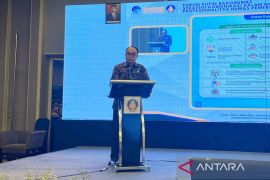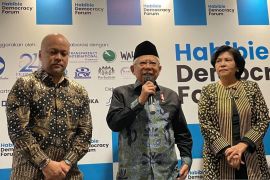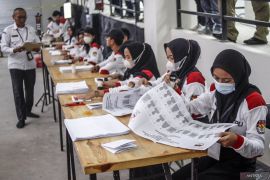Undoubtedly, policies are required for the next five years to tackle stunting, which is caused by chronic malnutrition, and prevent its double impact, namely on health and intelligence.
For accelerating stunting handling, the government allocated Rp34.15 trillion (around US$2.16 billion) in 2022 and Rp30.4 trillion (around US$1.93 billion) in 2023.
The 2022 Indonesian Nutritional Status Survey (SSGI) pegged Indonesia's stunting rate at 21.6 percent.
The government is targeting to reduce stunting prevalence to 14 percent this year. To reach the target, Indonesia needs to reduce stunting prevalence by 3.8 percentage points in both 2023 and 2024.
A challenge that is no less serious is the handling of stunting, which is complex, including its prevention, which must begin at the stage of adolescence then pursued during pregnancy, and even, the first years of a child's life.
Stunting can occur even before a child is born, as reflected by data from the 2022 SSGI, which showed that 18.5 percent of babies were born measuring less than 48 centimeters in length. This also highlighted the importance of nutritional fulfillment in pregnant women.
The survey's results also showed that the risk of stunting in babies increased 1.6 times from the 6–11 month age group to the 12–23 month age group (13.7 percent to 22.4 percent).
This reflected inadequacy in the provision of complementary food, be it in terms of age suitability, frequency, quantity, texture, and food variety.
Commitment of candidates
It is indeed essential to study the commitment of presidential and vice presidential candidates' remedies for stunting handling.
Candidate pair number 1, Anies Baswedan-Muhaimin Iskandar, through the "Fair and Prosperous Indonesia for All" document, has promised to offer an assistance program for pregnant women for the first 1,000 days of their child's life to reduce stunting prevalence to around 11.0–12.5 percent by 2029.
The pair has also promised support to bolster the capacity of village cadres in terms of stunting handling, namely ensuring the availability of food with balanced nutrition, preventing infections, and improving environmental conditions.
According to Baswedan, stunting must be handled even before women get pregnant, namely by providing them balanced nutrition.
"Thus, the health of the prospective mother must receive attention. First, iron, where do you get it? From meat, from food. The second is iodine. The third is folic acid," he expounded.
Meanwhile, pair number 2, Prabowo Subianto-Gibran Rakabuming Raka, has promised to offer a free lunch program to the students of preschools, elementary schools, junior high schools, high schools, and Islamic boarding schools (pesantren).
Subianto and Raka also envisage a nutritional assistance program for pregnant women and under-five children with the aim of improving the health of families and supporting their economy. The program will target more than 80 million beneficiaries and aim to reach 100 percent coverage by 2029.
Furthermore, the pair has shared plans for a Healthy Children Card as part of social and health protection programs to handle stunting as well as a Balanced Nutrition program and a Mothers and Children Drink Milk (EMAS) program to prevent stunting.
Prabowo expressed optimism that stunting prevalence can be brought under 10 percent through the free lunch program, with the provision of sufficient animal proteins.
Then, pair number 3, Ganjar Pranowo-Mahfud MD, has described the stunting issue as a part of the excellent Indonesian human resources development program, as outlined in the "Towards Excellent Indonesia" vision, missions, and work programs document.
As part of mental and physical health programs, they have promised to offer a program that provides nutritional support and enables access to health services during the pregnancy and breastfeeding periods.
Ganjar and Mahfud have also shared plans for a health program for the first 1,000 days of life and nutritional fulfillment for children until the age of 5, with the target of reducing stunting prevalence to below 9 percent.
Their document also includes the 1 Village 1 Health Facility 1 Healthcare Worker program, which aims to make it easier for people to access first-level health services by ensuring the availability of doctors, healthcare workers, and essential medicines.
According to Ganjar, providing attention to and handling pregnant women until childbirth are key to preventing stunting.
Animal protein push
Director of maternal and child nutrition and health at the Ministry of Health, Lovely Daisy, said that a low intake of animal proteins can cause stunting in children.
"Based on research conducted on 130 thousand children aged 6–23 months in 49 countries, it was found that stunting in under-five children is caused by low intake of animal protein foods," she noted during a media gathering held to mark National Nutrition Day in Jakarta on Thursday (January 25, 2024).
Based on the standards from the results of the 11th National Food and Nutrition Conference (WNPG) in 2018, the adequacy level of calorie and protein intake of the Indonesian population per capita per day is set at 2,100 kcal and 57 grams of proteins.
According to the Food and Agriculture Organization (FAO), the consumption of eggs, meat, milk, and its derivative products in Indonesia is still categorized as low: egg consumption stands at 4–6kg per person per year, meat consumption is less than 40 grams per person, while consumption of milk and its derivative products is 0–50 kg per person per year.
Based on the 2022 National Socio-Economic Survey (Susenas), Indonesia's per capita protein consumption is already above the national protein consumption adequacy standard of 62.21 grams.
However, the figure is still quite low for animal protein sources: for fish, shrimp, squid, and shellfish, it is 9.58 grams; meat 4.79 grams; and eggs and milk 3.37 grams.
Indonesia will hold the General Elections on February 14, 2024, in which around 204.8 million voters are expected to participate.
The nation is hoping that the next leader will help bring about a reduction in stunting prevalence to realize a brighter future with excellent human resources.
Related news: Ministry presses for stunting prevention efforts in after-birth phase
Related news: Low intake of animal protein causes stunting in children: Ministry
Editor: Rahmad Nasution
Copyright © ANTARA 2024












